#science illustration
Explore tagged Tumblr posts
Text
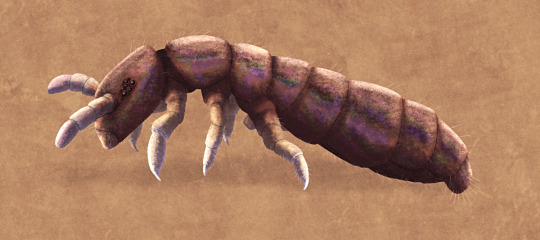
Rhyniella praecursor was an early springtail that lived during the early Devonian, about 410-400 million years ago, in what is now Scotland. Discovered in the exceptionally well-preserved Rhynie chert fossil site, it's one of the earliest known hexapods.
It was around 2mm long (~0.08") and closely resembled some of its modern relatives – with distinctive anatomical features like a collophore and a furca – showing that springtails were already well-established in such an early terrestrial ecosystem.
It probably had a similar sort of ecological role to modern springtails, too, being involved in the breaking down of organic matter and the formation of soils.
———
NixIllustration.com | Tumblr | Patreon
References:
Dunlop, Jason A., and Russell J. Garwood. "Terrestrial invertebrates in the Rhynie chert ecosystem." Philosophical Transactions of the Royal Society B: Biological Sciences 373.1739 (2018): 20160493. https://doi.org/10.1098/rstb.2016.0493
"Collembolans." University of Aberdeen School of Geosciences, https://www.abdn.ac.uk/geosciences/departments/geology/research/the-rhynie-chert/the-learning-resource-site/fossil-fauna/collembolans/
Whalley, Paul, and Edmund A. Jarzembowski. "A new assessment of Rhyniella, the earliest known insect, from the Devonian of Rhynie, Scotland." Nature 291.5813 (1981): 317-317. https://doi.org/10.1038/291317a0
Wikipedia contributors. “Rhyniella” Wikipedia, 03 Dec. 2023, https://en.wikipedia.org/wiki/Rhyniella
#science illustration#paleontology#paleoart#palaeoblr#rhyniella#springtail#collembola#hexapod#arthropod#invertebrate#art#rhynie chert
100 notes
·
View notes
Text
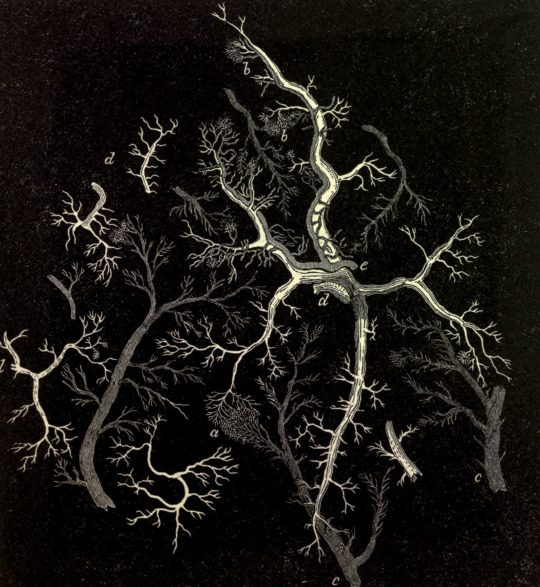
"Human liver in which the portal vein had been injected white." The physiological anatomy and physiology of man. 1859.
Internet Archive
4K notes
·
View notes
Text

Endangered Species of Japan 🌸
504 notes
·
View notes
Text
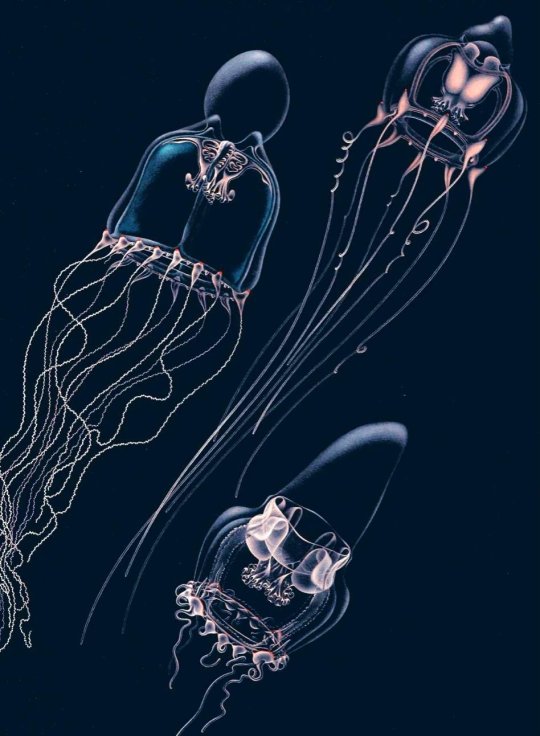
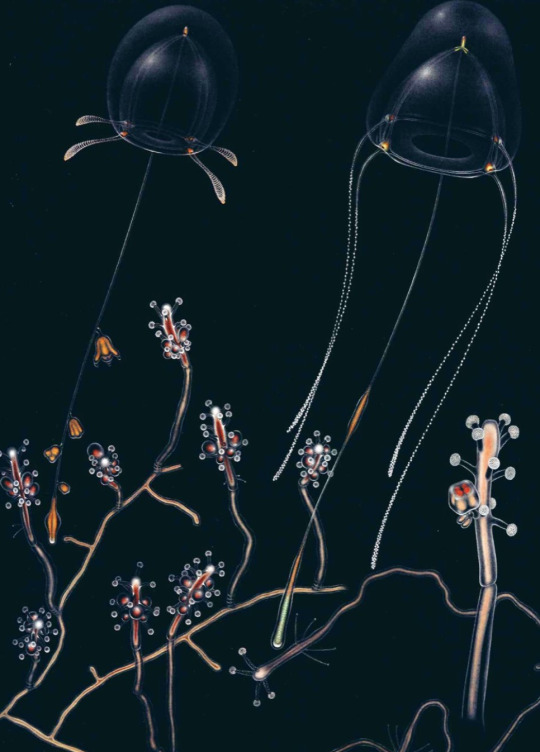
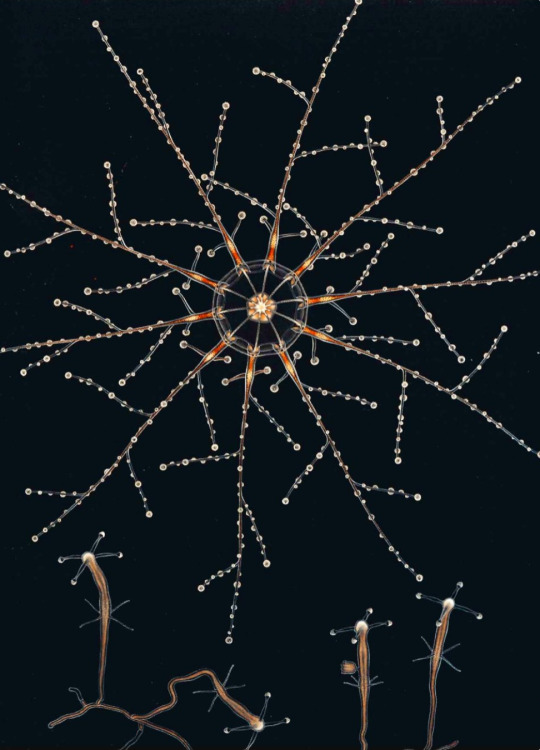
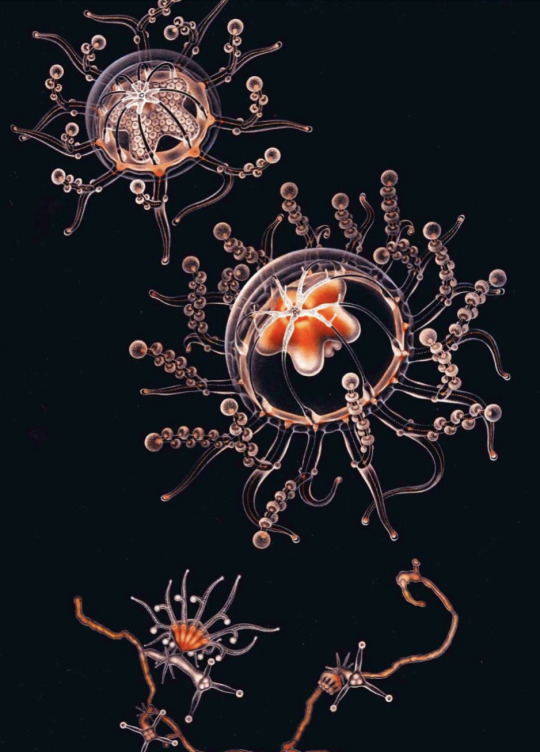

The lost jellyfish art of Ilona Richter, from Anita Brinckmann-Voss's 1970 book on jellyfish of the Mediterranean Sea...
#marine life#nature#ocean#science#illustration#science illustration#jellyfish#sea creatures#jellies#iridescent
4K notes
·
View notes
Text
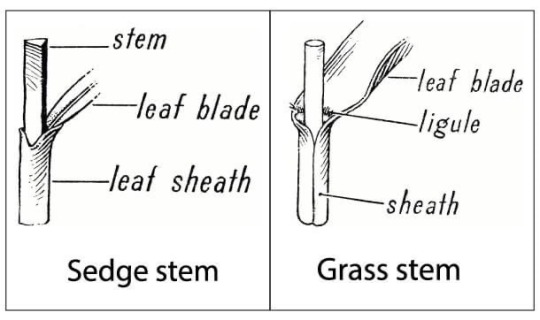
I’m sorry, but some of y’all really need to see this…
3K notes
·
View notes
Text

George Bartisch (1535-1607), ''Ophthalmodouleia'', Dresden Matthes Stöckel, 1583 I appropriated the gif from Duke University FYI. Bartisch's book was "the first Renaissance manuscript on ophthalmic disorders and eye surgery" and he became known as the "father of modern ophthalmology". But, there's a caveat dear reader: "Despite his scientific calling, Bartisch was a superstitious man, believing that astrology, magic, and witchcraft played a significant part in the causes of disease." (Public Domain Review)
#George Bartisch#medical illustration#German physicians#brains#skulls#science illustration#science gifs
98 notes
·
View notes
Text



Ever wonder what role corals play in tropical reef ecology? Find out by taking up the mantle of Team Coral! Cover the reef with colonies clad in sturdy calcium carbonate and fend off dastardly, quick-growing algae!
#What is your favorite reef creature you'd love to see in Benthos#benthosgame#tell me#we'll put it in there#haha just kidding#unless...?#marine biology#marine biology art#marine conservation#reef science#coral reef#coral#algae#board games#card games#card game design#card art#tabletop games#game development#digital illustration#science illustration#stem education#oceanography#marine ecology
28 notes
·
View notes
Text

Some colorized bits from my recent free printable zine WHY WE MASK: It's Not "Just A Cold"! I purposefully made the whole thing b&w to make printing as cheap as possible, but it's fun to add color especially to the snot-splosions.
HEY COMICS FRIENDS going to SPX or other cons this weekend - MASK UP, EAT OUTDOORS, and REST if you start feeling run down. COVID-19 levels are BAD bad right now (it's currently the worst September out of the whole pandemic) and the government does not have our backs. This virus causes YEARS worth of horrible vascular, neurological, and immune system damage, and each infection raises your chances of gaining fun new disabilities that could prevent you ever making comics again.

I strongly advice cancelling festivals, cons, indoor dining, anything involving crowds indoors OR outdoors, etc. But I know people depend on income from cons, so: PACK MASKS, NASAL SPRAY, and CPC MOUTHWASH and actually use them! If you develop any COVID-19 symptoms (headaches, dizziness, nausea, stomach pain, diarrhea, sore throat, sore joints, etc) don't assume it's "just a cold". Stay in your dang hotel room and REST! You can TRY to "push through" to keep tabling but you are NOT gonna like the long-term results (aka Long COVID).

I care about all you comics people and I want you to enjoy many more decades of making and sharing and reading comics with each other. If you're feeling sick at a show this weekend and don't know what to do, drop me a line! No judgements. Take care of yourself and each other out there and remember, no one can rest your body for you but you.
(Image Descriptions are in the Alt Text. Also please feel free to print my zine and hand it out if you do go)co
#indie comics#spx 2024#covid safety#covid isnt over#sci art#sciart#graphic medicine#science illustration#covid is airborne#long covid#disability justice#disability community#queer comics#lgbtq comics#comics convention#mask up#public health#we keep us safe#workers rights#comics art#con crud#covid resources
62 notes
·
View notes
Text

CROP: An autumnal scene at the Institute Pond: onlookers observe a gravitational-wave-emanating event in the dark, star-filled water — two black holes orbiting around one another, sending out ripples. Art by Olena Shmahalo for The Institute Letter.
#olena shmahalo#sciart#illustration#science illustration#physics#portfolio#astrophysics#astronomy#gravitational waves#black holes#space art#human artists#artists on tumblr#NoAI#No AI
37 notes
·
View notes
Text
Te dejo un CHISMECITO: aquí el corazón humano
#corazon#boop#human heart#art#realmente#egnalosm#genalosm#neurodivergent#neuroscience#solmjias#science#science illustration#sciencieheart#🚀#❤️#📌#🙆#solangmejias#reflexiones#chismecito
108 notes
·
View notes
Text

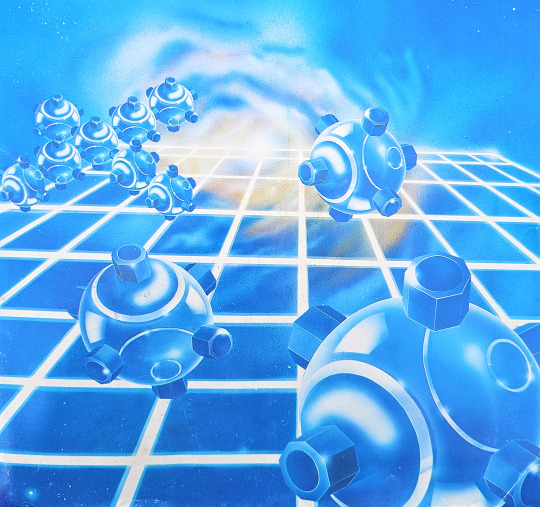
🤖 Illustrations from Motorized Capsela Science Discovery Design Manual, 1993 🤖
Capsela was a construction toy line featuring gears and motors encased in clear plastic spheres, which can be combined to create a wide range of static and moving models. This manual meant to provide instructions for assembling and working with Capsela components to build various designs.
#vintage ephemera#90s#vaporwave#retrocore#1993#nostalgia#science#technology#vintage illustration#science illustration
34 notes
·
View notes
Text
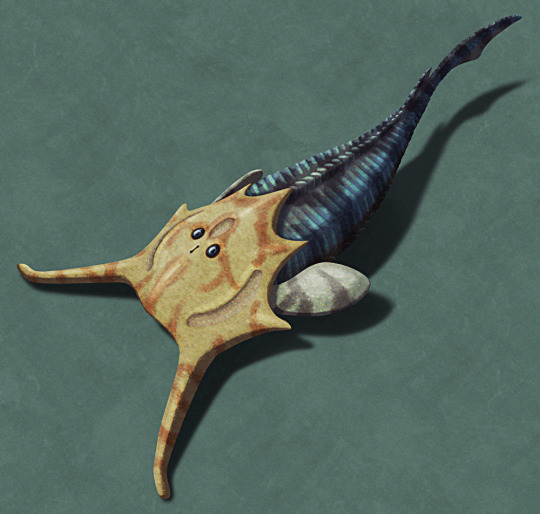
Osteostracans were an ancient group of jawless fish, closely related to early jawed vertebrates, whose fossils are known from the mid-Silurian to the late Devonian of what is now North America, Europe, and Asia.
They were heavily armored, with bony head shields and rows of large scales covering their bodies. While their flattened shapes and upward-facing eyes have resulted in them traditionally being interpreted as mud-grubbing bottom-dwellers, their paddle-shaped pectoral fins, dorsal fins, and strong tails indicate they were also quite good swimmers – and their diverse hydrodynamic head shield shapes suggest they probably had a much wider range of ecologies than previously thought.
Although many osteostracans had large flaring spines on the sides of their heads, or long snout-like spikes at the front, Tauraspis rara here was unique in having two long front-facing horn-like projections.
Around 7.5cm long (~3"), it lived in brackish and freshwater environments in what is now northern Siberia during the early Devonian, about 410-407 million years ago. Like other osteostracans it had a small keyhole-shaped "nostril" opening, and large patches of sensory organs known as "cephalic fields" on the sides and top of its head shield.
The fields were covered with a mosaic of small bony plates, and their exact function is still a mystery – but they may have been involved in sensing vibrations in the water, or possibly even been electric organs.
Similarly, what Tauraspis used its unusual pair of "horns" for is also unknown.
———
NixIllustration.com | Tumblr | Patreon
References:
Ferrón, Humberto G., et al. "Computational fluid dynamics suggests ecological diversification among stem-gnathostomes." Current Biology 30.23 (2020): 4808-4813. https://doi.org/10.1016/j.cub.2020.09.031
Janvier, Philippe. Early vertebrates. Oxford University Press, 1996. https://www.researchgate.net/publication/294830957_Early_vertebrates
King, Benedict, Yuzhi Hu, and John A. Long. "Electroreception in early vertebrates: survey, evidence and new information." Palaeontology 61.3 (2018): 325-358. https://doi.org/10.1111/pala.12346
Mark-Kurik, Elga, and Philippe Janvier. "Early Devonian osteostracans from Severnaya Zemlya, Russia." Journal of Vertebrate Paleontology 15.3 (1995): 449-462. https://doi.org/10.1080/02724634.1995.10011241
Wikipedia contributors. “Osteostraci” Wikipedia, 25 Jan. 2024, https://en.wikipedia.org/wiki/Osteostraci
#science illustration#paleontology#paleoart#palaeoblr#tauraspis#boreaspididae#benneviaspidida#osteostraci#jawless fish#vertebrate#art#actually they're not so much “horns” as a “bone mustache”#since the mouth is below and the “nose” is above
847 notes
·
View notes
Text

"Phases of Saturn's rings." A fourteen weeks course in descriptive astronomy. 1870.
Internet Archive
4K notes
·
View notes
Text
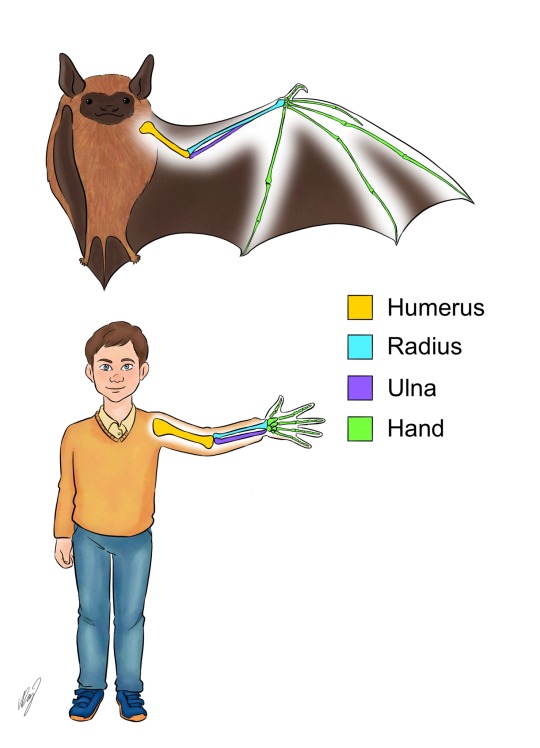
Bat and human arm bones~
I figured it’d be something to help a child visualise the similarities
78 notes
·
View notes
Text

#illustration#phylogeny#evolution#cephalopod#nautilus#octopus#squid#Cuttlefish#science art#science illustration#scientific illustration
23 notes
·
View notes
Text

Fritz Kahn (1888-1968), 'Der Mensch als Industriepalast' (Man as an Industrial Palace), 1926 This poster depicting the internal function of the human body as a set of inter-related industrial processes was included in Volume 5 of Kahn's, ''Das Leben des Menschen'' (The Life of Man) which was published between 1922-1926. Kahn's style of explaining the human body through infographics went on to be widely copied and imitated. You can read more on this poster and on Kahn here if you're interested.
#Fritz Kahn#german-jewish artist#german-jewish physician#infographics#medical illustration#science illustration#poster art
106 notes
·
View notes